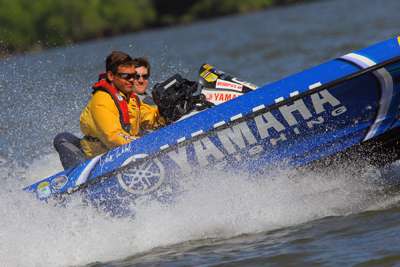
Two years of saving regional tournament winnings enabled Dave Wolak to quit his job in 2004 and turn pro. Adhering to a “skinny” budget funded by his savings, Wolak decided to fish the Bassmaster Tournament Trail for a couple of years.
Despite lacking major sponsorship in his early days as a pro, Wolak managed to win Bassmaster Rookie of the Year honors in 2005 and the Bassmaster American tournament in 2006. Competing in the Bassmaster Elite Series and qualifying for five Bassmaster Classics has helped Wolak gain 16 sponsors and earn the financial backing to continue his pro career.
The North Carolina pro stresses it takes discipline to budget for a pro career. “The hardest part is managing what you need to do versus what you want to do,” he says. “What you want to do is fish all the time, but what you need to do is work and take the right steps to make some money.”
Aspiring pros need to set goals when drawing up a budget for a fishing career. “Are you going to come out and be an Elite Series player in one year? No, probably not,” says Wolak. “So you have to set realistic goals and figure it’s going to take several years to reach that level. Set your budget to fish regionally so you’re not as far away from home and don’t have as many expenses.
That way, you can still work at the same time. I’m a firm believer that until you dominate and are a standout at one level, you shouldn’t try to participate at the next level.” Wolak’s yearly expenses illustrate how costly it is to play the pro game. “I’m a tournament warrior and fish a lot of different stuff with several organizations at several different levels,” says Wolak who pays as much as $75,000 in entry fees every year. His next biggest expense is fuel, which he estimates is about $20,000 to $25,000 a year.
Lodging costs range from $5,000 to $10,000 per year with about the same annual cost for his food. When expenses reach this level, gaining sponsorship becomes critical in financing a pro career. “It’s extremely important, especially when you take it beyond your local and regional level,” says Wolak. “When you start participating in national tournaments, you’re becoming a national promoter.
Ultimately, one third of your job is going to be promoting.” In addition to tournament winnings and sponsorship money, Wolak also receives some income from seminars, boat show and store promotional appearances.
Competing at the national level is a high-risk, high-reward game that can pay off for smart investors. “It’s like making an investment in stocks,” says Wolak. “You only want to make investments where you have a good chance of a return. It’s the same with tournaments and promotions.
You want to go to events that you think you can do well from the fishing aspect, but you also want to get some press because those impressions are valuable for your sponsors.” Those impressions go a long way in providing equipment and revenue to keep Wolak rolling smoothly on the Bassmaster Elite Series.
Editor’s Note: If you have a story idea you would like to vote on for an upcoming poll, send your idea to john@jnoutdoors.com.

